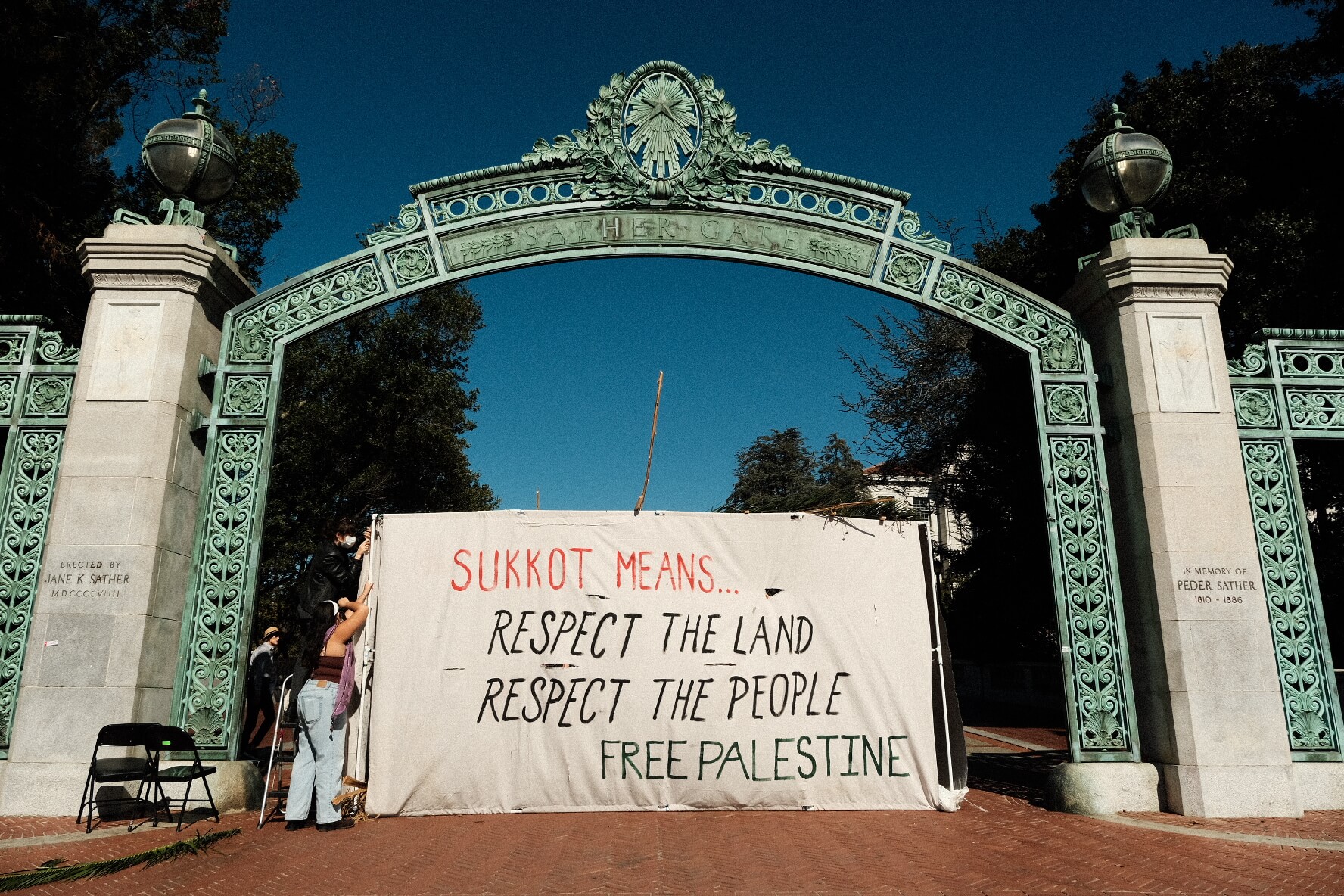‘Gaza solidarity’ sukkahs test new campus protest rules
Schools have been quick to shut down the protests, with many pointing to new regulations introduced after the tent encampments last spring

A “Gaza solidarity sukkah” at the University of California, Berkeley. Photo by Jewish Voice for Peace
Students at more than a dozen universities have built “Gaza solidarity sukkahs,” connecting the Jewish holiday, which is celebrated by living in temporary outdoor structures, to the pro-Palestinian tent encampments that popped up at schools across the country last spring.
Police have dismantled several of the structures, spurring claims that they are infringing on the religious freedom of Jewish students.
At UCLA, Graduate Students for Justice in Palestine built a sukkah at the center of campus on Monday morning and several tents were set up nearby.
A banner near the encampment read, “Resistance is justified from Warsaw to Palestine” next to a red triangle that is associated with support for Hamas.
Police swept the site Monday night, forcing around 40 protesters to leave and arresting one person who refused the order to disperse. A fire marshal had previously warned organizers that the sukkah was a fire hazard, though the Daily Bruin noted that Chabad and Alpha Epsilon Pi did not appear to have received similar warnings about their sukkah, which was located nearby.
Jewish Voice for Peace, a national anti-Zionist group with a large presence on campuses across the country, was quick to accuse university officials of trampling on the rights of Jewish students who were using the holiday to protest Israel.
“It is not the right of a university to pick and choose which religious rituals students can observe,” the organization wrote on Instagram, in response to police at Northwestern University removing a solidarity sukkah.
A spokesperson for the Evanston school told the Chicago Tribune that the structure was unauthorized and that the students involved would “face disciplinary action.”
The swift moves by university officials to remove the booths before any new encampments could take root reflect the enforcement of new “time, place, manner,” restrictions implemented on many campuses after the protests last spring, during which more than 2,000 students were arrested, mostly on trespassing charges that were later dropped.
These rules have been supported by major Jewish organizations like Hillel International and generally seek to regulate the behavior of protesters rather than their speech, although critics say they are meant to chill activism targeting Israel.
Campus protests this school year have generally been more muted than those last fall that began after the Oct. 7 Hamas terrorist attack against Israel, in which militants killed around 1,200 Israelis and took more than 200 hostages to Gaza. Protests have largely focused on Israel’s subsequent war in Gaza, which has killed more than 40,000 Palestinians.
A dedicated core of activists have continued demonstrating. The Sukkot protest in particular underscores the divide between anti-Zionist Jewish students, who make up an estimated 20% of Jewish college students, and institutions like Hillel and Chabad, which are strong supporters of Israel.
Jewish students are marking the Jewish holiday of Sukkot by building Liberation and Gaza Solidarity Sukkahs on campuses nationwide–with more and more campuses joining each day. pic.twitter.com/hK5GyXbG7I
— Jewish Voice for Peace (@jvplive) October 21, 2024
Paz Baum, a senior at Northwestern who helped build the solidarity sukkah, told the Tribune that his group does “not feel comfortable in those spaces that explicitly support” Israel and therefore needed to celebrate Sukkot elsewhere.
Baum said that Sukkot, which involves a commemoration of the Jewish exodus from Egypt, was about Jewish displacement and that Jewish Voice for Peace was using the holiday to mark Palestinian displacement in Gaza.
Not all schools have cracked down on Sukkot protests. At Brown University, which experienced less rancor than many other schools last year, the school stated that Jews for Ceasefire Now were violating school rules by sleeping in a sukkah they erected on campus. But officials did not appear to have removed it as of Tuesday afternoon. The organization is also protesting a decision by Brown’s board of directors not to divest from Israel. “We will stay visible,” Rafi Ash, a member of the group, told the Brown Daily Herald.
Solidarity sukkahs at the University of Chicago, Stanford, Bryn Mawr and Western Washington University were also still standing Tuesday, according to JVP spokesperson Sonya Meyerson-Knox.
Other situations were still unfolding, including a sukkah at New York University that students relocated to a nearby park after school security surrounded it with barricades.
Officials at the University of California, Berkeley removed a sukkah that students had erected in the middle of the school’s famous main gate one day after it was built, disrupting holiday plans for some of the organizations.
“We’re not entirely sure what we’re going to do about Sukkot without a sukkah,” Valerian Weinzweig, a Jewish Voice for Peace member, told the Daily Californian.















